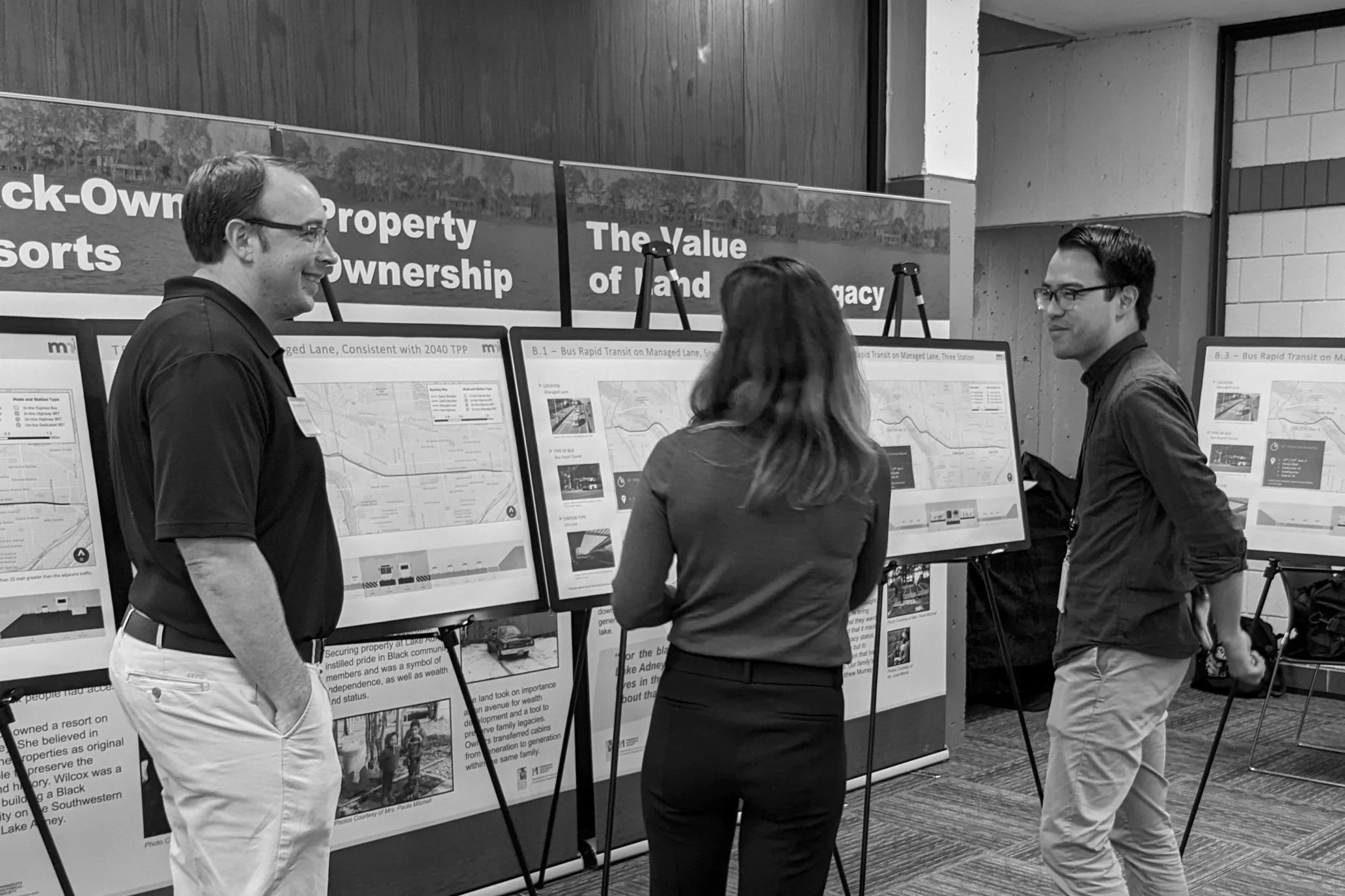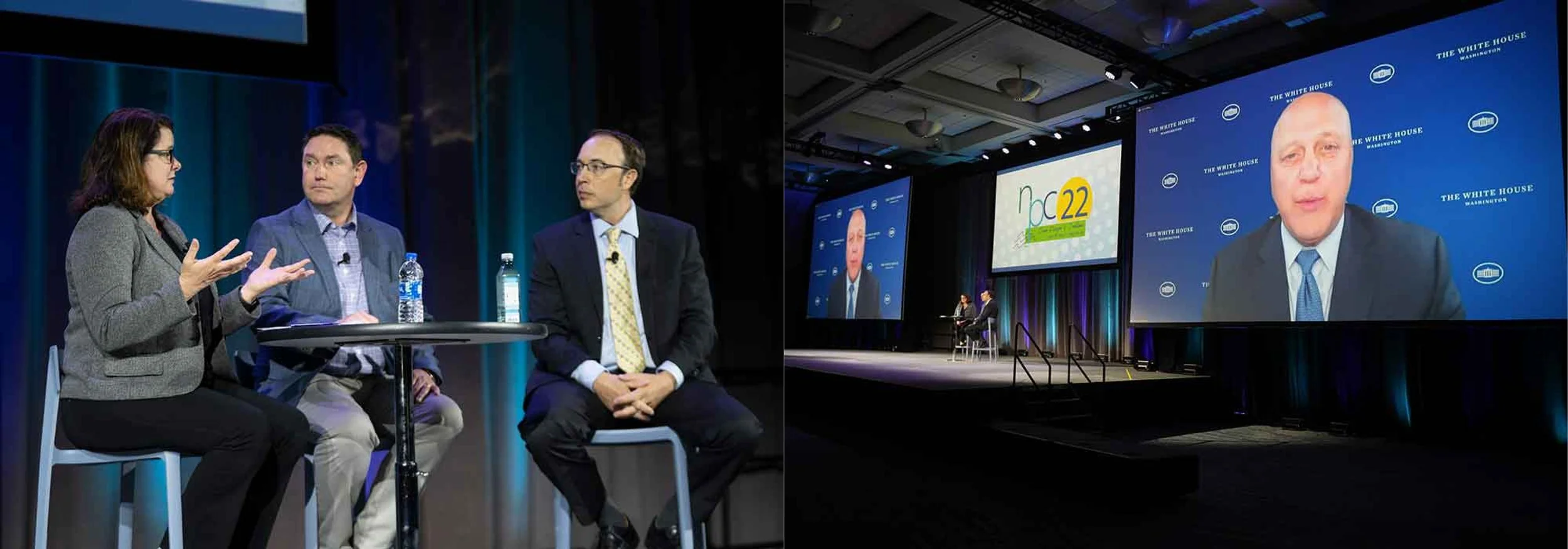Inspiring a New Generation of Transportation Planners: A Conversation with Robert McHaney, Chief of Integrated Planning at TGC
Inspiring a New Generation of Transportation Planners
A Conversation with Robert McHaney, Chief of Integrated Planning at TGC
By ANA PRADILLA and JOANNE MA, NOMA, ASSOC. AIA
AUSTIN, TX – In January 2023, Robert McHaney, AICP, CTP, was officially appointed Chair of the American Planning Association (APA) Transportation Planning Division (TPD). He will serve a two-year term for one of the largest APA membership divisions.
Based in Austin, TX with over 15 years of industry involvement, McHaney is no stranger to community service, professional development, and advocacy. Prior to his appointment as Chair, he served as APA TPD State Liaison, Chair of Transportation and Funding for the APA Policy Committee, and Vice Chair of Outreach and Chapter Liaison Coordinator for the APA TPD Executive Committee. He has helped lead numerous APA events, such as the APA National Planning Conference (NPC) 2022 Day of Service and Career Day, as well as workshops and panels focusing on infrastructure policy and innovation. One of seven Texas Delegates, he reviews and votes on APA policy and is a Certified Transportation Planner (CTP), a certification beyond the American Institute for Certified Planners (AICP) with less than one hundred certification holders in the U.S.
According to McHaney, every role has shaped his outlook on the planning profession, and it’s a hopeful one.
Process-driven and perceptive, McHaney carefully considers every side of the equation. He brings special focus on integrated practice as both an includer and activator, supporting and inspiring confidence in others with genuine sincerity, candor, and kindness. He is breaking down silos and shaping a new culture of professional planning.
Read on for a Q&A and discover more about integrated planning, where it stems from, industry shifts, and ways emerging professionals can get involved now.
Q: Walk us through your history with the American Planning Association (APA). What inspired you to join?
A: Professional development is important to me. What inspired me about APA were the multiple disciplines within the organization.
At the beginning of my career, I was involved in various professional organizations such as APA, Transportation Research Board (TRB), American Public Transportation Association (APTA), and a couple of local ones. Afterwards, I realized I was spreading myself a little too thin. So, after thinking through each organization, I chose to serve APA because it includes a variety of disciplines and skill sets, as planning should. Planning involves zoning, land use, economic development, design, private practice, public practice, rural, urban, transportation…you name it! I felt APA was the organization that offered the most benefit while allowing me to share my skill sets and give back.
2022 APA NPC Day of Service - Community Stakeholder Meeting, Charrette, and Walk Audit for a Safe Routes to School (SRTS) Project | Source: TGC
Q: Tell us more about the APA Transportation Planning Division (TPD).
A: This division includes nearly 2,500 members across the country, and approximately 20% of members are students. We run different programs, including student paper competitions, small grants competitions, Days of Service, and our annual State of Transportation Planning (SoTP) magazine publication. For the next pipeline generation of planners, it is my mission to advocate for them, connect experiences and opportunities for them, and support knowledge-sharing, education, and collaboration. This mission describes a three-pillar framework during my tenure as APA TPD Chair: Educate, Advocate, and Connect.
Q: Where did your passion for transportation and integrated planning stem from?
A: That’s a big question. Transportation is related to everything we do in our lives. It is related to land use, economic development, quality of life, and more. I am passionate about transportation because it involves the social sciences, arts, and data science - three practices joining together to create a transportation vision. This is fascinating to me.
Integrated planning stems from the fact that we, as planners, have formed different tribes, silos, or practices, and we need to break down these silos, which does not well represent our profession. We already live in a divided nation, and the profession does not have to be divided as well. As planners, engineers and designers, we all bring so much value. Imagine planners, engineers and designers working together to shape the society we envision and want to live and thrive in. This approach does not mean that we can't have healthy discord - I think we absolutely should. Instead, this approach requires planners, engineers and designers to willingly join around the same table and critically think through complex problems together. Because what an urban designer brings to the table will likely be different from an engineer or planner. All ideas, life experiences, backgrounds, and professional expertise should flow into a plan and towards a shared vision.
“For the next pipeline generation of planners, it is my mission to advocate for them, connect experiences and opportunities for them, and support knowledge-sharing, education, and collaboration. This mission describes a three-pillar framework during my tenure as APA TPD Chair: Educate, Advocate, and Connect.”
2022 APA NPC Panel titled Implementing the Federal Infrastructure Investment and Jobs Act featuring White House Senior Advisory and Infrastructure Coordinator Mitch Landrieu, APA Public Affairs Director Jason Jordan, and Robert McHaney in San Diego, California | Source: Hoffman Photography
Q: Describe your teaching experience.
A: As an AICP instructor, I don't necessarily teach what the material is. I teach [AICP] candidates how to grow and learn and be better planners, rather than solely how to take a test. AICP certainly exists to serve as a valuable credential, but more importantly, it highlights hundreds of hours of experience outside the traditional classroom. This practical experience is a very important part of the program. It is more about the process, not the results. Most people who go after the process typically get the results. And those who chase just the results don't often receive the results they want.
Q: What do you hope to achieve in your profession?
A: There are two activities within the planning profession I genuinely enjoy. I appreciate traditional planning, where we set the vision, mission, and goals – some examples include a Safety Plan or Transportation Master Plan. I also enjoy implementation planning, where we identify projects with the highest community need that otherwise would not be able to receive the funding to get them off the ground. Some representative projects include TGC work in Dayton, Wimberley, and Houston, TX, among others, where we design safer and walkable streets and improve quality of life. As a personal goal, my work and profession must have some sort of long-term significance. I am driven to utilize every skill and platform given to me, and with time and growth, bring people together towards a shared vision.
City of Conroe, Texas and TGC Staff presents at the 2023 South West Transit Association (SWTA) Annual Conference in Aurora, Colorado | Source: TGC
Robert McHaney presents at the 2023 South West Transit Association (SWTA) Annual Conference in Aurora, Colorado | Source: TGC
“It is more about the process, not the results. Most people who go after the process typically get the results. And those who chase just the results don’t often receive the results they want.”
Q: According to their website, APA exists to elevate and unite a diverse planning profession. Based on your roles as an integrated planning leader, outreach volunteer and industry mentor, what is the importance of guiding the next pipeline and generation of planners? How do you inspire others to partake in roles to support not only future generations but also the current one?
A: I am sure most of us [planners] have ultimately chosen this profession to utilize our talents and skill sets to improve communities. So, how do we make sure we don't lose focus on this mission, while living in an unpredictable world? The next generation of planners will likely feel this divisiveness even more… Knowing this, current leaders must continue to drive planning efforts, build upon equity and justice work, and overcome this growing divisiveness to ultimately develop and shape visions for a better world. And what does a “better world” look like? Well, that is up for healthy debate and discord.
I also support emerging planners, especially in my APA position, by simply asking. I identify those who have volunteered, shown interest, and care about the profession, and I connect them with opportunities to do more than just participate. The idea is to have more advocates for the profession, and this kind of active involvement ignites lasting inspiration towards collective action. At the end of the day, I would say helping people feel valued is key to co-powering others to get involved. And there are a variety of ways to achieve this.
Robert McHaney presents project boards and engages with attendees at a Transit Open House Meeting in St. Paul, Minnesota | Source: TGC
Q: Any advice to recent graduates and emerging planning professionals, driven to lead meaningful projects, but may not exactly know where to start?
A: Get involved. Raise your hand. Don't be afraid to voice your opinions. You have gotten this far. Your opinions matter. Certainly, find a mentor and work with one or two different mentors. Mentorship will help you build your confidence. You belong here, you are valued, and you have a lot to offer to the planning profession.
This conversation has been edited for length and clarity. Comments, questions, or suggestions? Email contact@thegoodmancorp.com.
For additional information or questions, contact TGC to learn more about our services, our team, and our mission to connect capital to communities across Texas and beyond.






